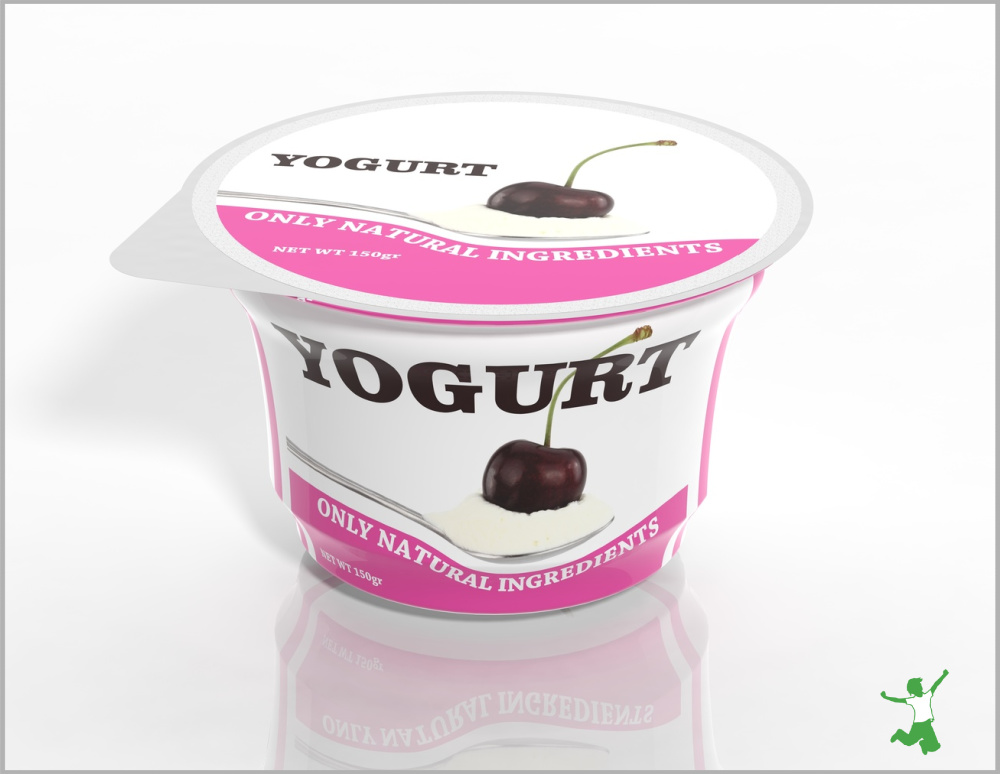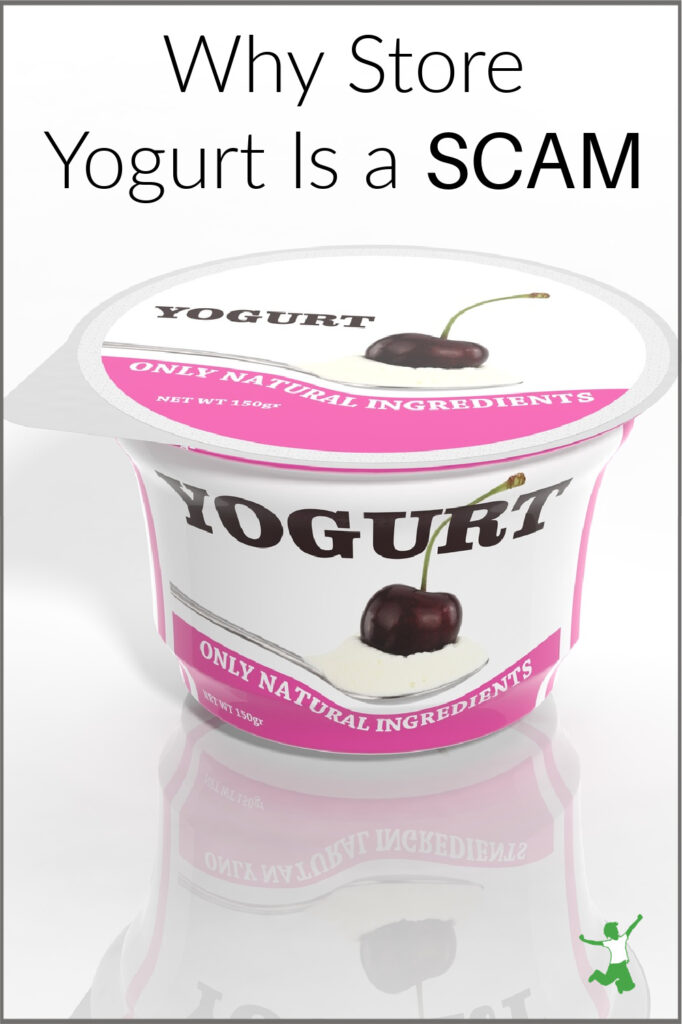The reasons why it is usually a waste of money to buy yogurt at the grocery store, the very few brands that are legit, and the best approach for enjoying yogurt that is truly probiotically active without breaking the bank.

As I was standing in line at the grocery store the other day, I noticed an older lady in front of me had an entire cart loaded with commercial yogurt.
I immediately felt very empathetic as she obviously was placing high importance on store yogurt in her diet. Perhaps she was attempting to help some sort of chronic digestive issue caused by the typical overmedicating of people her age.
What is really sad is that it is virtually certain that she was experiencing little to no benefit from her efforts and money spent.
This is because standard store yogurt, including those squeezable yogurt tubes for kids, is not the probiotically beneficial food that TV commercials and other compelling advertisements would lead you to believe.
The truth is that commercial yogurt is fermented for very short periods of time.
This includes highly popular Greek yogurt alternatives.
Improper Fermentation
The length of fermentation for commercial yogurt brands is so short (one person in the dairy industry told me that it is an hour or even less) that thickening agents are commonly added to give it the look and feel of real yogurt.
This is why Dr. Natasha Campbell-McBride MD, author of Gut and Psychology Syndrome, recommends avoiding commercial yogurt.
Instead, she recommends making yogurt at home and fermenting it for a full 24 hours to achieve maximum gut healing benefits.
The Specific Carbohydrate (SCD) Diet also recommends yogurt that is cultured for a full 24 hours.
Milk Sugars (Lactose) Still Present
Another problem that occurs by cutting corners at the factory is that commercial yogurt still contains plenty of lactose, as there was insufficient time for it to be completely consumed by the beneficial microbes.
Lactose is a disaccharide sugar, which is very difficult to digest for anyone with a digestive disorder.
Raw milk and raw yogurt contain lactase, the enzyme for digesting lactose, but pasteurized and homogenized store brands do not even if they are organically certified (heat destroys the enzyme lactase).
Thus, consuming commercial yogurt can often trigger autoimmune symptoms until steps are taken to heal and seal the gut wall so that it is no longer permeable.
In short, not only will store yogurt NOT help heal the gut, it can potentially make the situation WORSE.
GMO Sweeteners
Another problem with commercial yogurt is that sweetened versions often are of GMO origin.
Even health-savvy shoppers often don’t realize that if the label on commercial yogurt says “sugar”, it is virtually certain that sugar is also from a GMO source (beet sugar).
Only if the label says “cane sugar” or “organic sugar” does this guarantee that the sugar is GMO-free.
Other Considerations
Of course, making yogurt at home permits the selection of high-quality milk and avoidance of all the additives and sugar added to most commercial versions.
Yogurt fermented for 24 hours will most definitely assist your gut with the help of beneficial (though transitory) cultures that good quality yogurt is loaded with.
It is also helpful to note that yogurt made with raw milk will be naturally more drinkable-style like kefir than yogurt made with heated or pasteurized milk.
Cannot Make Yogurt Yourself?
The best policy when it comes to yogurt is to always make it yourself or buy it from a small farm that uses quality grass-fed milk (preferably raw) and ferments it properly.
You don’t need a yogurt maker! I make raw yogurt using a slow cooker. You can even make yogurt using your microwave (turned off, of course!) or oven as a low-temperature incubator.
If you must buy commercial yogurt when traveling, be sure to seek out one of the only two brands of 24-hour yogurt I’ve found that are commercially available (White Mountain and St. Benoit).
If you’ve come across any others, please add them in the comment section!
My online shopping hack will help you find these brands very quickly even if you are unfamiliar with the area you are visiting.








Ilana how do you make your own without raw milk?
Crap, I really loved that store-bought Vanilla yogurt, too. I wonder if the good bacteria are damaged by the pasteurization process?
Sarah, from someone who met you in line at the grocery store due to your inquiry about the raw milk I was buying, THANK YOU! I have learned so much just from our chance encounter, and it has changed our lives forever for the better. Keep spreading your wealth of knowledge. You never know how it may improve someone’s life!
Hi Candace, I must have gotten a good vibe from you as I don’t usually speak up in grocery store lines! LOL 🙂
Also, I made my first batch with a crock-pot. I don’t own a yogurt-maker.
I recently made my first batch of homemade yogurt which came out very good. I used Brown Cow Yogurt. Recently however, my local co-op was able to get whole milk Stonyfield for me and my mom and I have been devouring it. While I agree that regular, store-bought, conventional-brand yogurts are not likely to do you much good, I do feel that the brands that Weston A. Price Foundation recommends are good. The WAPF recommends either whole milk Stonyfield or Brown Cow as good quality store-bought yogurts. Also, as readers above mentioned, Many local brands are probably also very good quality but, it’s good to do your research.
It is almost overwhelming how much crap is in the grocery store…So now I need to order yogurt making cultures? Eeek!
Speaking of probiotics and yogurt, that low-fat store-bought sugar loaded junk ain’t worth the money– buy local… http://t.co/X9QYLFZZ
Het verschil tussen fabrieksyoghurt en #yoghurt waar, in weerwil van wat #AH stelt, geen melkpoeder aan te pas komt. http://t.co/fHtE5Gc0
Amazing how much credence otherwise-intelligent people are willing to give a stranger on tv, being paid to read a script about how great some mass-produced concoction is, without a critical thought on it.
Amazing how much credence otherwise-intelligent people are willing to give a stranger on tv, being paid to read a script about how great some mass-produced concoction is, without a critical thought on it.